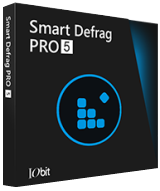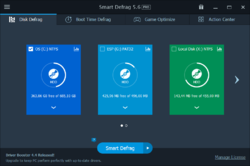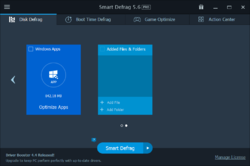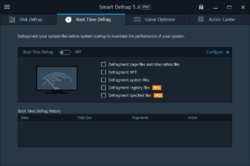Every day we offer FREE licensed software you’d have to buy otherwise.

Giveaway of the day — Smart Defrag 5.6.0
Smart Defrag 5.6.0 was available as a giveaway on June 25, 2017!
Smart Defrag is a safe, stable and easy-to-use disk defragmenter that provides maximum hard disk performance automatically and intelligently. With the new generation of ultra-fast defrag engine, Smart Defrag 5 can not only defragment users' HDD but also trim SSD to accelerate disk read/write speed and enhance disk durability. Users can easily defrag large files and consolidate free spaces with the newly added Large File Defrag and Free Space Defrag for more efficient defragmentation. You can also enjoy the best game experience with Game Optimize in Smart Defrag 5.
Please note: the license is provided for 1 year.
System Requirements:
Windows XP/ Vista/ 7/ 8/ 8.1/ 10
Publisher:
iObitHomepage:
http://www.iobit.com/iobitsmartdefrag.phpFile Size:
10.3 MB
Price:
$19.99
GIVEAWAY download basket
Comments on Smart Defrag 5.6.0
Please add a comment explaining the reason behind your vote.





i love the software
Save | Cancel
First, it's OK to defragment an SSD, but it should NOT be done often. In fact, because access time to data stored on an SSD is many, many times faster than access on a spinning hard drive there is only a slight benefit to defragging an SSD and that would only be if the drive is largely filled up and you had installed and uninstalled a lot of programs, games, etc. so that a considerable amount of fragmentation has occurred. In other words, most users will rarely, if ever, need to defragment an SSD.
Second, Windows 10 optimises your drives by default which may, at times, include some defragging of your SSD.
Third, today's Giveaway is surely aimed at Windows XP users due to its lack of TRIM and its less efficient defragmenting. Another point worth mentioning is that almost all SSDs have a built-in feature called garbage collection. This feature operates like TRIM except that it is activated periodically by the drive's own controller software rather than by Windows every time you delete something and the computer is idle for a few moments. So, garbage collection ensures that SSDs used for Windows XP and other operating systems which lack TRIM will still be tuned up and keep running smoothly.
Save | Cancel
starvinmarvin, this is not just aimed at XP users. Bear in that the majority of users still used hard drives, not SSDs, and Smart Defrag is offered as an alternative to the standard Windows defrag.
Save | Cancel
I think iObit's Smart Defrag is one of the more popular defrag apps out there, which differ mainly in how they decide what files should go on the fastest part of a conventional hard drive partition. They use Windows itself to do the actual work -- deciding what goes where, and how long it takes to analyze the files & make those decisions, can vary from one defag app to the next.
Windows uses the FAT32 &/or NTFS file systems, which store data in small chunks -- when it writes a file to disk [or other storage, e.g. a USB stick], it fills up one sector, then the next, then the next & so on until all the data is written & stored.
ntfs[.]com/hard-disk-basics.htm
On a conventional hard drive read/write heads move back and forth to access all of the storage area on the circular platters where data's stored. If the sectors making up a file are scattered about all over that storage area, those heads can have a lot of jumping around to do just to read that one file. Defragmenting a conventional hard drive moves the sectors making up each file so that they're *physically* in sequence. At the same time all files are consolidated towards the beginning of the partition -- why you'd run a defrag before shrinking the size of a partition. Optimizing a conventional hard drive puts the files you use most often [or those for a game, or those that Windows uses to start etc.] close together, so again the heads don't spend so much time jumping around.
Flash memory doesn't have the same physical limitations as a conventional hard drive, so the physical location of the sectors making up a file are irrelevant. A SSD is likely to spread sectors that are in use around, so that each small storage unit gets roughly the same amount of use -- the memory chips in a SSD have a finite lifespan, i.e. you can read/write only so many times before the chip fails. A conventional hard drive OTOH works until it doesn't -- it may fail sooner or later than the average lifespan for that make/model. When a conventional hard drive's running, IOW the device using it is on, restricting the number of reads/writes is thought to have no real impact on its lifespan -- restricting &/or reducing writes to a SSD does prolong its life. Logically running a defrag on a SSD will reduce it's lifespan, and may counter its built in load balancing.
Since TRIM is mentioned, what is it? If a one is recorded on a conventional hard drive, to change it to zero you just write zero in the exact same place. To do the same thing with a SSD, you 1st have to clear the one, then in a 2nd step write the zero. That takes longer, so SSDs, on their own or when Windows or an app tells it to, *proactively* clear storage that's no longer in use [e.g. you deleted the file], so writing data only takes one step.
Save | Cancel
In general, IObit develops outstanding software, so I suspect this Defragger is top notch; the only problem I have with it is that it is IObit. Have not been an IObit fan since the turn of the century. Not a Norton fan either, for the same reasons.
Save | Cancel
Correct me if I am wrong, but doesn't Windows 10 have a defrag that works automatically? I seem to recall reading that a couple of years ago. I used to defrag on Windows 7 on a monthly basis, and I had it already set to do so weekly on its own. The manual defrags I did monthly almost never needed because of that, and fragmentation never got over 1%.
Since getting Windows 10, I have not been able to even see the defrag feature. Can this let me see how my HDD is doing?
Save | Cancel
L. Cleveland Major, starting with Vista, Windows automatically defrags your hard drives once a week.
However, third party defragmenters such as Smart Defrag, have more features, and in some cases can increase performance more than standard Windows defrag.
Save | Cancel
Been using iobit products for almost a decade. I love them! I have the pro version of advanced system care! Installation and registration were flawless!
Save | Cancel
Had this a few years back, and after about a month had several corrupted files on a 1 Tb hdd. Found this to be the culprit by running tests on an ext hdd, and, same result: corrupted video files. BE CAREFUL! Caveat emptor!
Save | Cancel
The Pro Edition is supposed to have an SSD module which does something called "Trim" which is designed for an SSD. However the box shot says it's pro while the product description on GOTD does nothing to clarify if it is or not. A bit confusing if you ask me.
Save | Cancel
I've used IObit Smart Defrag Pro for about a year. It's set to run with windows and auto defrag. Works fine for me ...no issues on Windows 10, 64 bit. I can recommend it.
Save | Cancel
Wery good program!
Save | Cancel
Registration key are not accepted.
Save | Cancel
Par, did you copy and paste the code in? make sure there's no space after the last number.
Save | Cancel
Par, after you download it, you have to open readme.txt and it will show you a registration key that works.
copy and paste it after you click on enter code on the down rt portion of the defrag screen.
Save | Cancel
After using an older version of Smart Defrag, it uninstalled itself. I scanned with my antivirus and used anti-malware programs and found nothing that could have caused it. It was simply gone.
Save | Cancel
Brian, if you tried installing the newest version of this program? A lot of software programs will automatically uninstall the older version before it installs the newest.
Save | Cancel
Jim, in my case, it never installed a new version. After startup, it opened and almost immediately it closed and uninstalled itself. I never received a notification of an update.
Save | Cancel
I think this is a great program
Save | Cancel
DO NOT use this on a SSD Drive!! Doing so, will shorten the life of your SSD Drive, GREALY!!
Save | Cancel
Lori, first of all, this is smart enough to recognise SSDs, and will not defragment them.
Due to way SSDs work you won't see any significant benefit from defrgamenting then. However, on the other hand, they have such a long life, that defragmenting them won't hurt them. It's just a myth that SSDs have a short life span.
I have a cheap Chinese SSD which I've been using for nearly two years, and has it had 32 terabytes of data written to it. According to Hard Disk Sentinel, the drive reports its remaining life percentage at 91%. This means, in theory, it could last for around twenty years of heavy usage.
Save | Cancel
Lori, It doesn't defrag the ssd - it supports TRIM for ssd's and offers different kinds of defrag modes for the conventional hdd. The program is rather fast, and I decided to give it a go - even, Windows, offers the service for free - even the TRIM part. There's a big difference, and you don't need to worry about the life span of your ssd drive - this time ;-)
Save | Cancel
Roger, "this is smart enough to recognise SSDs, "
It did test this software in Win10 on a SSD.
And it did defrag a SSD:
https://www.dropbox.com/s/xrpx4rvtruuqd1n/SSD.png
Later on I did test it on a Win8.1 and then it did TRIM a SSD.
Save | Cancel
Roger, I understand, that a SDD can have a long life span, but I also understand, that a SSD has a limited number of writes, that it's physically capable of. With that in mind, defragmenting a SSD willl shorten the life of the SSD, because of all the writing of data that is performed, during defragmenting.
Save | Cancel
170625
Roger, in 2015 ("two years ago") there were NO 32TB ssd. There were alota 250GB - 1TB ssd (e.g. Samsung 850 evo, Crucial M550 and MX100) in the 2.5" form factor. The big thing was NAND flash memory SLC vs MLC vs VLC.
Save | Cancel
Ootje, occasionally it fails to recognise that is a drive is a SSD. If you click on the arrows to the right of where is says HDD, the text will change to SSD, and the drive will now be correctly identified as a SSD.
Save | Cancel
bubu, if you reread my comment, I never said I have a 32TB SSD. It is a 256GB SSD, but I have written 32 terabytes of data to in the last two years.
Save | Cancel
Lori, it's not possible to have both a long life span and a limited number of writes. SSDs do not have a limited number of writes.
I've written 32 terabytes of data to my SSD in the last ywo years, and in theory the driver should be good for about another 270 terabytes of data. That is not a limited life span.
Save | Cancel
Roger, I did notice the arrows now. And I could change the ID of the drive from HD to SDD
Thnx
Save | Cancel
TK, It is a cheap consumer SSD from Kingfast, although it does use MLC rather than SLC. At the time of purchase, my budget was extremely limited, which is why I did not opt for a brand name SSD. So far, I've had no issues with the drive.
Save | Cancel
TK, according to the manufacturer, my drive does has ECC. Also they rate it as being as being good for 100GB of writes per day, for eight years.
Of course the Chinese sometimes lie when it comes to specs. So maybe it will fail well before the estimated lifespan. Time will tell.
Save | Cancel